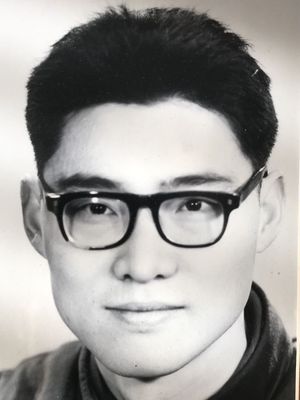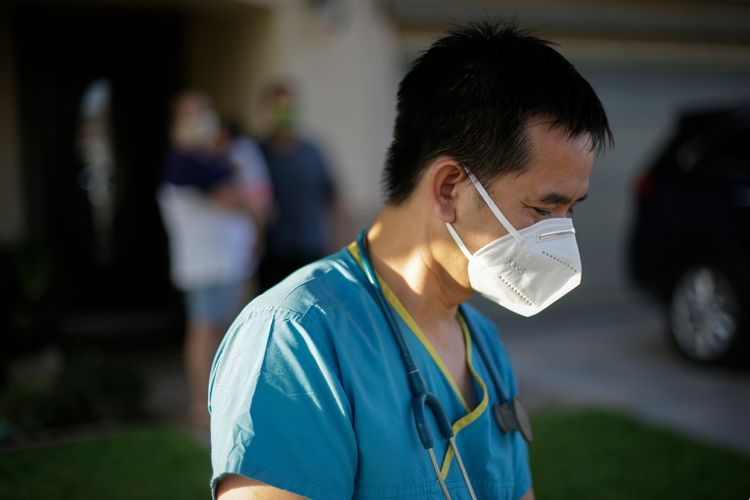Nursing during the pandemic has taught Conners the value of self-care, which includes taking care “of my mind, my mental? well-being,” said Conners, who estimates he has witnessed 100 patients die from COVID-19.
Sometimes “I feel like COVID just beat me. … Or I feel like I just lost in a battle with COVID.”
Also read: Asians in Germany Targets of Racist Stereotypes, Violence
Wengang Zhang, 67, was born in China’s Sichuan province, and arrived in the U.S. in 1988 with a medical degree he’d earned from what is now the Chongqing University of Medical Sciences.
A primary care doctor, he completed his U.S. training in 1999 with a residency at the University of California-Los Angeles Medical Center.
Zhang told VOA Mandarin the biggest challenge he faced to be able to practice medicine in the U.S. was “definitely the language but another big difference is the system, insurance kind of stuff. I had never heard about … medical insurance, or Medicare, Medicaid.”
 Dr. Wengang Zhang arrived in the US in 1988. He's a primary care doctor in California.
Dr. Wengang Zhang arrived in the US in 1988. He's a primary care doctor in California.He practices at the Springhill Medical Group in Contra Costa County, east of San Francisco, where he treats patients who are “white, they are Black, Spanish or Pacific Islander.”
He told VOA Mandarin he admitted the county’s first COVID-19 patient after being called to a local emergency room.
“I can tell you exactly the day …March 1st. … Everything, the data, matched whatever we were learning from China’s experience.”
The county’s first COVID-19 patient turned out to be one of Zhang’s own, “a healthy young guy, and he had no idea where he got it.”
After the examination, Zhang left the hospital, opened all his car’s windows, drove home, parked, stripped and rushed to take a shower without stopping to talk to his wife.
“It's actually in my over 20-something years of practice, the first time when (I realized) my own life may be in danger because I saw this patient,” said Zhang.
According to an investigation by Kaiser Health News and The Guardian, of the 3,561 health care workers who have died on the U.S. front line as of January, 21% were Asian/Pacific Islanders.
One who survived COVID-19 is Tsering Dechen, 28, a Tibetan who arrived in the U.S. in 2010 after finishing high school in Nepal, following her mother’s urging to get a good education.
After a series of odd jobs, she earned a bachelor’s degree in nursing from Lehman College, in New York City, in 2019. She’s a progressive care nurse at Elmhurst Health & Hospital in New York City, a job she started weeks before the first COVID-19 cases arrived.
Her workplace is in the heart of Queens, a borough known for a rich diversity of residents from Africa, Asia, Europe, Oceania, and South and Central America.
“I feel like Elmhurst Hospital is the best example that one can have on how we all coexist together,” said Dechen, who says she’s been hearing of violence directed at Asian Americans, in particular an attack on an Asian American doctor.
Candid thoughts re: #StopAsianHate
No amount of inner fortitude will protect me against stupid, reckless behavior...
— Austin Chiang, MD MPH (@AustinChiangMD) March 20, 2021
“Why would you attack a person, a single person, just because he's Asian American?” she asked. “How can you blame a pandemic on just one single person?? How can you show your angst and attack somebody like that?"
“Every day I realize how similar we are,” Dechen told VOA Tibetan. “Our elderlies, their needs … you see how much of a similarity there (is) ...in these different ethnicities."
Tien Tan Vo, 44, graduated from Ross University School of Medicine in the West Indies and is now medical director of VO Medical Center in California’s Imperial Valley, an agricultural area bordering Mexico.
He began treating COVID-19 patients last March, when he faced the most difficult days of the pandemic because “we didn’t have enough tests at that time.”
Patients wanted to be tested, and “they, of course, …(were) very anxious, (it’s) very, very frightening, they want to know the result right away. … (It’s) very, very stressful, very stressful …about the testing and the anxiety level of this pandemic.”
Vo, who was born in Vietnam’s Binh Dinh province, sent the tests to San Diego for processing and told patients they had to wait for the results.
He recalled walking out to the parking lot of his clinic to test one patient who was later diagnosed with COVID-19.
 FILE - Dr. Tien Tan Vo leaves after talking with a family quarantining after they tested positive for the coronavirus July 23, 2020, in Calexico, California.
FILE - Dr. Tien Tan Vo leaves after talking with a family quarantining after they tested positive for the coronavirus July 23, 2020, in Calexico, California.“I came out with a full PPE (protective personal protective gear), I covered from head to toe because we don't know what's going on with the virus … and I asked her to lower the window and she started crying and she couldn't talk because she was (out of breath) as she's gasping for air.”
Transferred to the local hospital and then to a San Diego medical center, the patient was ventilated, the family was frantic, “then on Day 11, she turned around, suddenly got better on her own,” Vo told VOA Vietnamese.






























